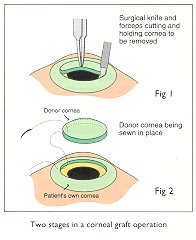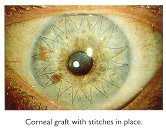Dorah has just undergone a corneal graft operation on her right eye. This
was needed because her own cornea was severely damaged during the fire in which
she received her terrible injuries. The cornea was clouded to the extent that
it was not possible for Dorah to see through. Her lens had also been damaged
and had to be removed.
Bronwen Jones has written an article about the corneal graft operation and
this will appear in The Times newspaper shortly. After the publication of the
article, the full text will appear on this website.
What follows is a brief explanation of the corneal graft operation and some
statistics relating to corneal grafting in the UK.
Statistics
2216 corneas were transplanted in the UK in 1998. This was a decrease of 4%
relative to 1997; this year there is an increase of about 6% so far. There are
approx 200 corneal graft centres in the UK. The total waiting list is unknown
since only those with special medical needs, 424 patients (31 Dec 98), are
recorded centrally.
There are 3 major eye banks with many opthalmic units having their own local
bank. Most corneal donors are patients who have died, due to cancer, in a
hospice. Very occasionally live donation is possible. This is when an eye has
to be removed to urgently treat a living patient; there were 4 such donations
in 1997 and none in 1998. Where tissue matching is a requirement then corneas
will be retrieved from kidney donors who are routinely tissue typed. Sometimes
the Eye Banks make appeals for corneal donations because their stocks are
running very low.
When one considers that there are probably 300,000 deaths each year where
eye retrieval should be possible it highlights the communication/resource
difficulties that exist.
The Operation
 |
The cornea is the window at the front of the eye. In a
normal eye the cornea is clear. Light is able to enter through the clear
cornea, pass through the clear lens to focus on the retina at the back of the
eye. When the cornea is deformed or damaged from injury or disease light cannot
pass freely to the retina. The picture that the retina passes to the brain is
not clear and sight becomes distorted or patchy.
|
 |
A corneal graft operation involves the removal of part of
the damaged cornea and its replacement with a similar piece from a donor eye.
These donor eyes are ones which have been removed from a person who has died.
The individual or their family consent to the use of the eye for medicla
purposes after their death.
|

|
The stitches that hold the corneal graft in position are
normally left in place for at least a year after the operation. In Dorah's
case, they will probably never be removed.
|
| Acknowledgements: The
trust would like to thank John Evans for the statistical information. Thanks
also go to Moorfields Eye
Hospital, London, who own the copyright of the above images.
|